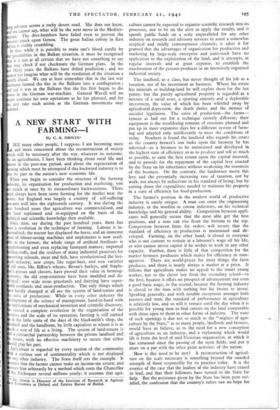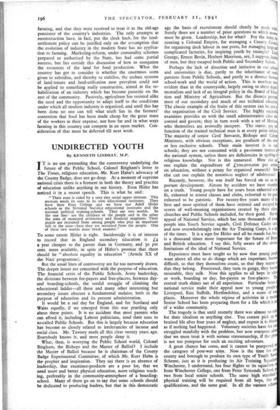A NEW START WITH FARMING -I
By C. S. ORWIN*
IKE many other people, I suppose, I am becoming more and more concerned about the reconstruction of society hich will be necessary after the war, whatever its outcome. s an agriculturist, I have been thinking about rural life and bour in the post-war period, and about the regeneration of rming which must be attempted if this backward industry is to ay its part in the nation's new economic life.
When you begin to consider the structure of the farming dustry, its organisation for production and 'marketing, you e struck at once by its extraordinary backwardness. There ust always have been some farming for the market near the ens, but England was largely a country of self-sufficing asants well into the eighteenth century. It was during the xt hundred years that agriculture was commercialised, and e land replanned and re-equipped on the basis of the clinical and scientific knowledge then available.
Since then, say during the past hundred years, there has n a revolution in the technique of farming. Labour is in- ustrialised; the tractor has displaced the horse, and an immense ray of labour-saving machines and implements is now avail- e to the farmer; the whole range of artificial fertilisers is pplementing and even replacing farmyard manure; imported eding-stuffs, and the residues of many industrial processes for averting oilseeds, meat and fish, have revolutionised the live- k industry; new crops, like sugar-beet, and new varieties old ones, like Biffen's wheats, Bevan's barleys, and Staple- n's grasses and clovers, have proved their value in farming- onomy; the old crop-rotations have been modified and de- oped ; over wide areas grasslands and dairying have super- ed cornlands and meat-production. The only things which ye hardly changed at all are the system of land-tenure and e units of production. While in every other industry the 'elopment of the science of management, hand-in-hand with e applications of mechanical invention and scientific discovery, s caused a complete revolution in the organisation of the smess and the scale of its operation, farming is still carried in the little units of the days of the blacksmith's shop, the ndruill and the handloom, by little capitalists to whom it is as uch a way of life as a living. The system of land-tenure is 11 a patriarchal partnership between the private landlord and s tenant, with no effective machinery to secure that either ould play his part. Agriculture is regarded by every section of the community th a curious sort of sentimentality which is not displayed r any other industry. The State itself sets the example. It sumes that the farmer cannot make an income-tax return, and senses him arbitrarily by a method which costs the Chancellor the Exchequer several millions yearly; it assumes that agri- * Dr• Orwin is Director of the Institute of Research in Agricul- al at Oxford and Estates Bursar of Balliol. culture cannot be expected to organise scientific research into its processes, nor to be on the alert to apply the results, and it spends public funds on a scale unparalleled for any other industry on research and advisory services to assist a somewhat sceptical and mildly contemptuous clientele; it takes it for granted that the advantages of organisation for production and marketing by large-scale enterprise and joint-stock have no application to the exploitation of the land, and it attempts, at regular intervals and at great expense, to establish the anachronism of the peasant-producer in an intensively organised industrial society.
The landlord, as a class, has never thought of his job as a vocation, nor of his investment as business. Where his estate has minerals or building-land he will exploit them for the last penny, but the purely agricultural property is regarded as a mixture of a social asset, a sporting amenity and a deplorable investment, the value of which has been whittled away by agricultural depression, the death duties and the menace of socialist legislation. The units of production—the farms— remain as laid out for a technique entirely different; their equipment is the mouldering remains of erections planned and put up in more expansive days for a different system of farm- ing and adapted only indifferently to meet the conditions of today. Nowhere is found the landlord who regards his estata as the country brewer's son looks upon the brewery he has inherited—as a business to be maintained and developed in the highest state of efficiency so as to produce and sell as much as possible, to earn the best return upon the capital invested, and to provide for the repayment of the capital levy exacted by the State on his inheritance without weakening the resources of the business. On the contrary, the landowner meets this levy and the perennially increasing rate of taxation, not by work, not always by reductions in his standard of living, but by cutting down the expenditure needed to maintain his property in a state of efficiency for food-production.
The farmer's position in the modern world of productive industry is surely unique. A man can enter the engineering industry, or the woollen or cotton industries, on his technical knowledge and his general ability. Competition between appli- cants will generally secure that the most able get the best positions, and a man can rise from the bottom to the top. Competition between firms for orders will secure that the standard of efficiency in production is maintained and de- veloped. Farming, on the other hand, is closed to everyone who is not content to remain at a labourer's wage all his life, or who cannot invest capital if he wishes to work in any other capacity. Further, there is little of that competition for the market between producers which makes for efficiency in man- agement. There are world-prices for most things the farm produces, and there is nearly always a market at a price. It follows that agriculture makes no appeal to the smart young worker, nor to the clever boy from the secondary school—to the first, because it offers no prospect of advancement nor even a good basic wage; to the second, because the farming industry is closed to the man with nothing but his brains to invest. Speaking generally, and with notable exceptions amongst both masters and men, the standard of performance in agriculture is relatively low, and so will it remain until the day when it is possible for young men to find careers on the land comparable with those open to them in other forms of industry. The want of such openings is due not so much to the " neglect of agri- culture by the State," as so many people, landlords and farmers, would have us believe, as to the need for a new conception of agriculture as an industry, and a replanning which would lift it from the level of mid-Victorian organisation, at which it has remained since the passing of the open fields, and put it more on a par .with the other great activities of the nation.
How is this need to be met? A reconstruction of agricul- ture on the scale necessary is something beyond the unaided strength of those responsible for its practice today. It is the essence of the case that the leaders of the industry have ceased to lead, and that their followers have turned to the State for help. But the assistance given by the State has been pure out- relief, the confession that the country's rulers saw no hope for farming, and that they were resolved to treat it as the old-age pensioner of the country's industries. The only attempts at reconstruction have, in fact, put the clock back, for the land- settlement policy can be justified only on the assumption that the evolution of industry in the modern State has no applica- tion to farming. Marketing-reform, under commodity schemes prepared or authorised by the State, has had some partial success, but lies outside this discussion of how to reorganise the resources of the land for food production. What the country has got to consider is whether the enormous sums given to subsidise, and thereby to stabilise, the archaic systems of land-tenure and land-utilisation now prevalent could not be applied to something really constructive, aimed at the re- habilitation of an industry which has become parasitic on the rest of the community. Passively, agriculture has resisted alike the need and the opportunity to adapt itself to the conditions under which all modern industry is organised, and until this has been done no one can tell what truth lies in the farmers' contention that food has been made cheap for the great mass of the workers at their expense, nor how far and in what ways farming in this country can compete in an open market. Con- sideration of that must be deferred till next week.































 Previous page
Previous page